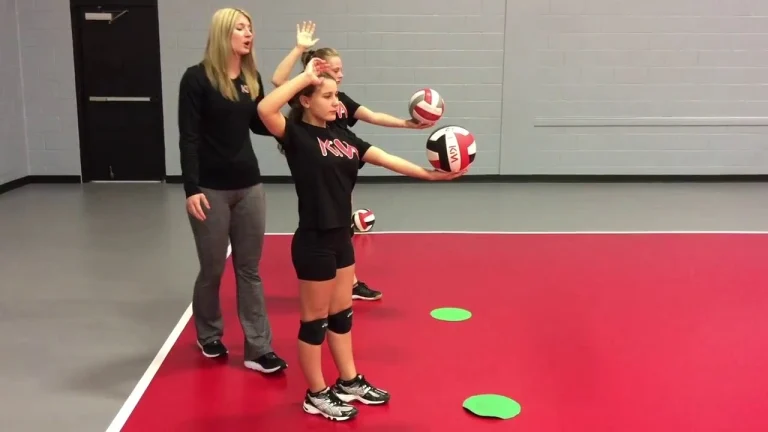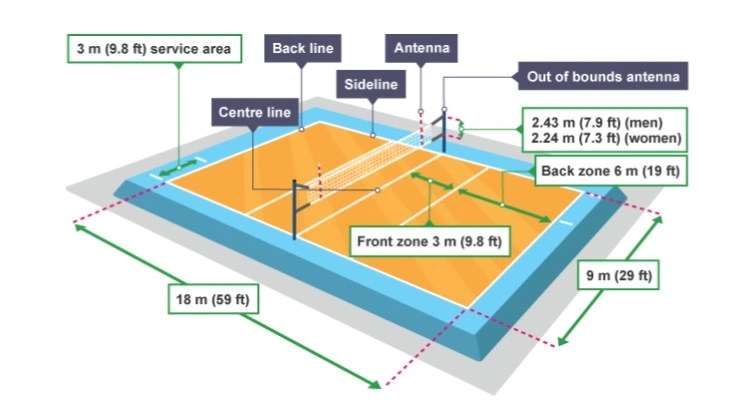The Latest Rule Changes in Volleyball: What You Need to Know and How They Impact the Game
Volleyball is always evolving. Each season brings new rules to improve the sport, make it safer, and enhance the game. As volleyball grows worldwide, players and fans must stay updated. This will help them understand the game and adjust their strategies.
This article will discuss the latest volleyball rule changes. We will cover their effects on the game and share our views on whether they improve the sport. Whether you’re a player, coach, or fan, understanding these changes is key to keeping up with the sport in 2024 and beyond.

What Are the Most Recent Rule Changes in Volleyball?
Before we dive into opinions, let’s review recent volleyball rule changes. They have caught the attention of players, coaches, and fans.
1. Libero Scoring System
One of the most talked-about changes in recent years is the adjustment to the libero’s role. Traditionally, the libero could only play in the back row and wasn’t allowed to serve or score. However, the new rule changes in some competitions allow the libero to serve and even score points for the team in specific situations.
Why This Matters:
Increased responsibility: The libero, already a key defensive player, now has a more active role in serving and scoring.
Strategic gameplay: Teams can use the libero’s agility in defense and tactical serves. This gives them more flexibility in their rotations.
Improved team dynamics: Libero players can now help build momentum, especially during tight games.
2. Challenge System Expansion
The challenge system is becoming more widely adopted across volleyball leagues, especially at professional and international levels. Much like in other sports, teams can now challenge referee decisions on key points such as touches, in-or-out calls, and net violations.
Why This Matters:
Fairer gameplay: Players and coaches can correct obvious mistakes by using the challenge system, reducing frustration over missed calls.
More accurate outcomes: The use of technology ensures that the right calls are made during crucial moments in the match.
Tactical challenges: Coaches need to be smart about when to use their challenges, as each team only gets a limited number of opportunities per set.
3. Extended Player Substitutions
In recent rule updates, certain leagues have allowed for more player substitutions during sets. This means that teams can swap out players more frequently without burning through their substitution limits as quickly.
Why This Matters:
More player involvement: Teams can give more court time to their bench players, helping them gain valuable experience.
Increased flexibility: Coaches can adjust lineups more to create favorable matchups. They can add height at the net or bring in strong servers.
Less player fatigue: More substitutions let key players rest longer. This helps them perform their best when on the court.
FAQs About the Latest Rule Changes in Volleyball
As these rule changes are rolled out, there are many common questions from both seasoned volleyball fans and newcomers to the sport. Let’s tackle some of the most frequently asked questions.
Do the New Rules Make the Game More Exciting?
The new rules, particularly the libero’s ability to serve and the expanded challenge system, are designed to increase the intensity and fairness of the game. With the libero more involved and the chance to correct referee errors, games are becoming tighter and more thrilling to watch. These changes bring out more strategy and give teams more tools to fight back during difficult moments.
How Do These Changes Affect the Players?
Players, especially liberos, now have to adjust their roles. This gives some players more responsibility and a chance to shine. However, they’ll need to work hard to master new skills, like serving, which wasn’t part of their game before. For other players, the changes mean fewer referee errors deciding games, so they can feel more confident that the game’s outcome is based on their performance, not bad calls.
Are There Any Drawbacks to These Changes?
While the new rules generally improve the game, there are a few concerns. For example:
Increased game duration: More challenges and substitutions can make games longer, which might slow the pace.
Learning curve: Players and coaches need time to adjust to the new rules, which could create confusion early on in the season.
Why These Rule Changes Matter in 2024
The rule changes in volleyball are designed to improve fairness, enhance strategy, and involve more players in the game. These shifts are especially important as volleyball continues to grow globally and become more popular across all age groups.
1. Encouraging Youth Participation
With the libero being able to serve and substitutions being more flexible, youth players will find themselves more involved in the game. Bench players, who may not have played much before, now have more chances to get on the court and develop their skills.
2. Professional and International Impact
At higher levels, including professional leagues and international competitions, these rule changes make a big difference. Games are more dynamic, and the challenge system ensures that the matches are won based on skill and performance, rather than human error. This creates a more competitive and fair environment, allowing fans to see the best players perform at the top of their game.
Our Final Thoughts: Do These Changes Improve Volleyball?
The latest rule changes in volleyball add more excitement, fairness, and opportunities for players of all levels. Whether you’re a libero taking on a bigger role or a coach navigating the expanded challenge system, these changes offer more strategic depth and fair play. In 2024, we believe these rules will continue to make the game more thrilling for both players and fans.
However, like all changes, it will take time for teams to adjust fully. But once they do, we’re confident that volleyball will continue to grow and develop into an even more dynamic sport.
So, what do you think? Have these rule changes improved volleyball, or do you prefer the way things were? Let us know your thoughts in the comments below!
Conclusion
The latest rule changes in volleyball are making the sport more engaging and fair. From the libero’s expanded role to the challenge system, these updates help enhance strategy, involve more players, and ensure a level playing field. As these changes roll out in 2024, players, coaches, and fans will see the game evolve in exciting ways.
Stay tuned for more volleyball updates and rule changes as the sport continues to adapt. And if you’re serious about improving your skills, staying updated on these changes will give you a clear edge!






